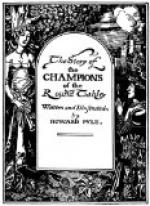Then the Lady Blanchefleur cried out in a great voice of suffering: “Say no more, for I am ashamed.”
Sir Percival said: “Nay, there is no shame to thee, but great honor to me.” But the Lady Blanchefleur would not hear him, but brake away from him in great haste, and left him standing where he was.
So Sir Percival could stay no longer at that place; but as soon as might be, he took horse and rode away. Nor did he see Blanchefleur again after they had thus talked together upon that terrace as aforesaid.
And after Sir Percival had gone, the Lady Blanchefleur abandoned herself to great sorrow, for she wept a long while and a very great deal; nor would she, for a long while, take any joy in living or in the world in which she lived.
[Sidenote: Of the further adventures of Sir Percival] So Sir Percival performed that adventure of setting free the duress of the castle of Beaurepaire. And after that and ere the winter came, he performed several other adventures of more or less fame. And during that time, he overthrew eleven knights in various affairs at arms and in all those adventures he met with no mishap himself. And besides such encounters at arms, he performed several very worthy works; for he slew a wild boar that was a terror to all that dwelt nigh to the forest of Umber; and he also slew a very savage wolf that infested the moors of the Dart. Wherefore, because of these several adventures, the name of Sir Percival became very famous in all courts of chivalry, and many said: “Verily, this young knight must be the peer of Sir Launcelot of the Lake himself.”
Now one day toward eventide (and it was a very cold winter day) Sir Percival came to the hut of a hermit in the forest of Usk; and he abode all night at that place.
Now when the morning had come he went out and stood in front of the hut, and he saw that during the night a soft snow had fallen so that all the earth was covered with white. And he saw that it likewise had happened that a hawk had struck a raven in front of the hermit’s habitation, and that some of the raven’s feathers and some of its blood lay upon the snow.
[Sidenote: Sir Percival stands in meditation] Now when Sir Percival beheld the blood and the black feathers upon that white snow, he said to himself: “Behold! that snow is not whiter than the brow and the neck of my lady; and that red is not redder than her lips; and that black is not blacker than her hair.” Therewith the thought of that lady took great hold upon him and he sighed so deeply that he felt his heart lifted within him because of that sigh. So he stood and gazed upon that white and red and black, and he forgot all things else in the world than his lady-love.
Now it befell at that time that there came a party riding through those parts, and that party were Sir Gawaine and Sir Geraint and Sir Kay. And when they saw Sir Percival where he stood leaning against a tree and looking down upon the ground in deep meditation, Sir Kay said: “Who is yonder knight?” (For he wist not that that knight was Sir Percival.) And Sir Kay said further: “I will go and bespeak that knight and ask him who he is.”




